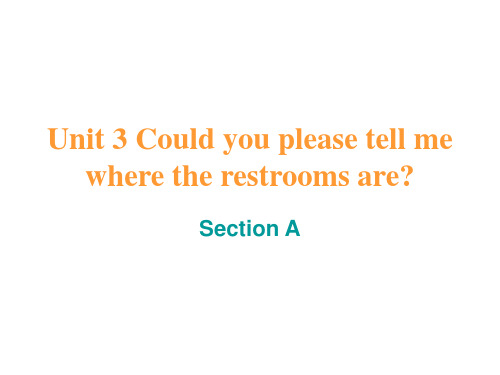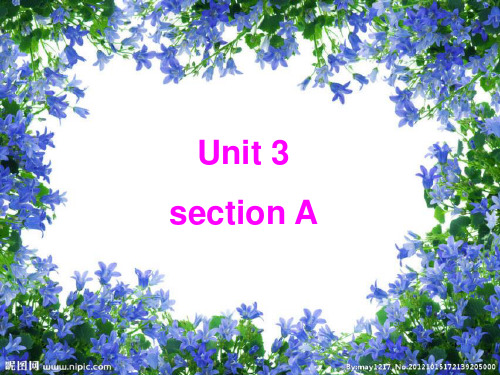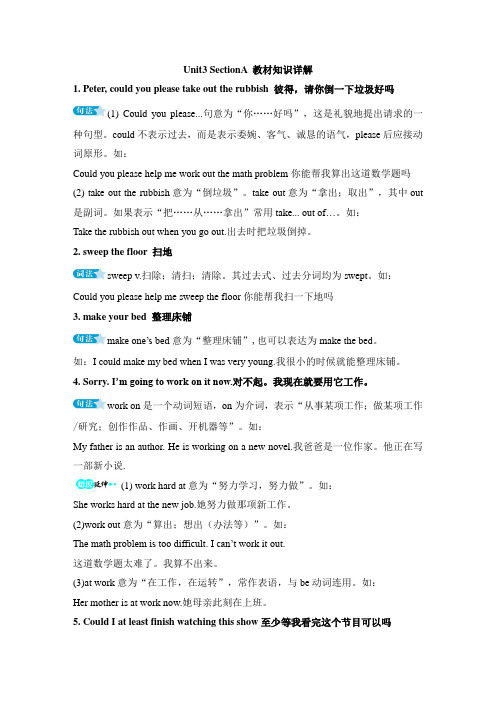Unit3_SectionA_教材知识详解
- 格式:doc
- 大小:12.61 MB
- 文档页数:5



Unit 3 Section A目标导航单词box n.箱;盒dictionary n.词典;字典excuse v.原谅;宽恕teacher n.老师;教师yours pron.你的;你们的thank v.感谢;谢谢for prep.为了;给;对help v.&n.帮助;援助短语pencil box 铅笔盒;文具盒thank you for...为······而感谢你excuse me 劳驾;请原谅his green pen 他的绿色钢笔用法与归纳 1.What about...?(询问消息或提出建议)······怎么样?/······好吗?2.-Is that...?那是······吗?-No,it isn't.不,它不是。
/Yes,it is.是的,它是。
3.help sb(to)do sth帮助某人做某事help sb with sth在某方面帮助某人句子 1.-Is that your schoolbag?那是你的书包吗?-No,it isn't.不,它不是。
2.-Are these your books?这些是你的书吗?-No,they aren't.不,它们不是。
3.What about this dictionary?这本字典呢?4.You're wele.不客气。
知识精讲知识点01 含be动词的一般疑问句的用法教材原句Is that your schoolbag? 那是你的书包吗?(P13)用法含有be动词的一般疑问句,其构成形式是将be动词放在主语之前,且be的首字母要大写,句尾用问号。
肯定回答用“Yes,主语+be.”,否定回答用“No,主语+be not”-Is this your eraser? 这是你的橡皮吗?-Yes,it is.是的,它是。

Unit 3 Section A目标导航单词outgoing adj.爱交际的;友好的;外向的fantastic adj.极好的;了不起的better adj.& adv.(good和well的比较级)较好的(地);更好的(地)both adj.&pron.两个;两个都which pron.&adj.哪一个;哪一些loudly adv.喧闹地;大声地;响亮地clearly adv.清楚地;清晰地;明白地quietly adv.轻声地;轻柔地;安静地win v.获胜;赢;赢得hardworking adj.工作努力的;辛勤的though adv.不过;可是;然而conj.虽然;尽管;不过petition n. 比赛;竞赛;竞争短语both...and......···和······都have fun 玩得愉快singing petition 歌唱比赛care about 关心;在意play the drums 打鼓用法归纳3.as+形容词或副词的原级+as与······一样······句子 1. And she also sings more loudly than Tara.并且她也比塔拉唱得更大声。
2.Oh,which one was Lisa?哦,哪一个是莉萨?3. Are you as friendly as your sister?你和你妹妹一样友好吗?知识精讲知识点01 outgoing adj.爱交际的;友好的;外向的教材原句I'm more outgoing than my sister.用法outgoing 用来描述人的性格,可作表语或定语,其比较级是more outgoing.She is an outgoing girl and she likes outdoor activities.她是个外向的女孩,而且她喜欢户外活动。

Unit3 SectionA 教材知识详解1. Peter, could you please take out the rubbish 彼得,请你倒一下垃圾好吗(1) Could you please...句意为“你……好吗”,这是礼貌地提出请求的一种句型。
could不表示过去,而是表示委婉、客气、诚恳的语气,please后应接动词原形。
如:Could you please help me work out the math problem你能帮我算出这道数学题吗(2) take out the rubbish意为“倒垃圾”。
take out意为“拿出;取出”,其中out 是副词。
如果表示“把……从……拿出”常用take... out of…。
如:Take the rubbish out when you go out.出去时把垃圾倒掉。
2. sweep the floor 扫地sweep v.扫除;清扫;清除。
其过去式、过去分词均为swept。
如:Could you please help me sweep the floor你能帮我扫一下地吗3. make your bed 整理床铺make one’s bed意为“整理床铺”,也可以表达为make the bed。
如:I could make my bed when I was very young.我很小的时候就能整理床铺。
4. Sorry. I’m going to work on it now.对不起。
我现在就要用它工作。
work on是一个动词短语,on为介词,表示“从事某项工作;做某项工作/研究;创作作品、作画、开机器等”。
如:My father is an author. He is working on a new novel.我爸爸是一位作家。
他正在写一部新小说.(1) work hard at意为“努力学习,努力做”。
如:She works hard at the new job.她努力做那项新工作。

Unit 3 Will people have robots?知识要点一:There will be fewer people. 将会有更少的人。
(1) there will be 意为“将有;会有”,是There be 的一般将来时,其否定形式是“There won't be...”,一般疑问句形式是“Will there be...?”There will be...有时可以与There is /are going to be..相互转换。
例如;(2) 【辨析】fewer/less[【only ,just 等时,常用a little 或修饰名词。
? buy知识100它们帮忙做家务并在脏的或危险的地方工作。
(1)help (sb.) with sth.=help (sb.) (to) do sth.意为“帮助(某人)做某事”。
例如:He often helps his mother with the housework .=He often helps his mother (to) do the housework .危险的 safe adj.安全的dangrer n.危险 其反义词为 safety n.安全dangerously adv.危险地 safely adv.安全地知识要点四:Today there are already robots working in factories. 现在已经有机器人在工厂里干活了。
(1) There be sb./sth.doing sth.意为“有某人/物正在做某事”,sb.或sth.与doing sth.构成逻辑上的主谓关系,并且表示动作正在进行。
例如:There is somneone talking in class.有人在课上说话。
There are birds flying in the sky.天空中有鸟在飞翔。
(2) already 意为“已经;早已”,用于肯定句,置于句中或者句末均可。
【解析 3】finish v 结束;完成finish doing sth 做完某事【2013 四川雅安 4】8.— Can you finish —Yes, I can.A. to readB. readC. readsD. readi ng4. I think two hours of TV is enough for you! 我觉得你看两个小时的电视已经足够了。
【解析 1] two hours of TV表示时间、距离、金额、度量等词语作主语时,通常被视作整体,谓语动词用单数形式How time is flies! Three years _______ (be) really a short time.人教版八年级英语Unit3 SectionA 重难点讲解1. Peter ,could you please take out the trash?彼得,你能把垃圾倒了吗? 【解析1】Could you please do sth ?请你(做) .. 好吗? 用于提出请求,希望得到对方的肯定回答,说话的语气比较客气委婉。
Could 不是can 的过去式,是委婉、礼貌的说法。
回答用 can.【常用答语】肯定回答: Sure./ Of course./ Certai nl y./No problem. 否定回答: Sorry , I can ' t【2013 湖北黄冈 3】40. — Could I borrow your camera?— _____________ , but please give it back by Saturday. A. I am sorry B. Of course C. Certa in ly n ot D. No, tha nks 【2013 内蒙古呼和浩特】 Tom , would you please ___ the box? It ' s for your sister. A. not open B. don ' t open C. not to open D. to not open 【解析2】take out 取出(v+ adv ) 【注】:跟代词做宾语,代词放中间; 跟名词做宾语,可放在中间,也可放在后边 ( )His teeth hurt badly. The dentist _____. A .take out it B. take out them C. take it out D .take them out 【短语】take out the trash 倒垃圾 take a walk 散步 take away 拿走,取走 take back 收回 _________ t ake place 发生 take off 脱下: 起飞 The gift is in the box. You can take itout. 【2013 黑龙江大庆】6. You had better hurry or we ' ll bfeitahs plane. The plane willin a few minutes.A. take upB. take dow nC. take off 2. Can you do the dishes.?那你可以洗盘子吗?D. take away do the dishes 洗碗 【结构1】do the +名词: 【结构2】do the +动词-ing【结构3】do one ' s 名词 do the dishes/ laundry 洗餐具 /衣服 do the cleaning 打扫卫生do one ' s housework/ homewor 做家务 /家庭作业 【结构4】do some +动词-ing do some reading/ shopping 读写书 /购物 ( ) He helps his mother _____ after every meal. A. does the dishes B. do the dish C. do the dishes D. does the dish 3. Could I at least finish watching this show? 至少让我看完这个节目可以吗? 【解析1】Could I do a sth?我可以做...... 吗?用于表达请求,语气比较委婉。
Unit3 SectionA 教材知识详解1. Peter, could you please take out the rubbish? 彼得,请你倒一下垃圾好吗?(1) Could you please do...?句意为“请你做……可以吗?”,这是礼貌地提出请求的一种句型。
could不表示过去,而是表示委婉、客气、诚恳的语气,please 后应接动词原形。
如:Could you please help me work out the math problem?你能帮我算出这道数学题吗?(2) take out the rubbish意为“倒垃圾”。
take out意为“拿出;取出”,其中out 是副词。
如果表示“把……从……拿出”常用take... out of…。
如:Take the rubbish out when you go out.出去时把垃圾倒掉。
2. sweep the floor 扫地sweep v.扫除;清扫;清除。
其过去式、过去分词均为swept。
如:Could you please help me sweep the floor?你能帮我扫一下地吗?3. make your bed 整理床铺make one’s bed意为“整理床铺”,也可以表达为make the bed。
如:I could make my bed when I was very young.我很小的时候就能整理床铺。
4. Sorry. I’m going to work on it now.对不起。
我现在就要用它工作。
work on是一个动词短语,on为介词,表示“从事某项工作;做某项工作/研究;创作作品、作画、开机器等”。
如:My father is an author. He is working on a new novel.我爸爸是一位作家。
他正在写一部新小说.(1) work hard at意为“努力学习,努力做”。
如:She works hard at the new job.她努力做那项新工作。
(2)work out意为“算出;想出(办法等)”。
如:The math problem is too difficul t. I can’t work it out.这道数学题太难了。
我算不出来。
(3)at work意为“在工作,在运转”,常作表语,与be动词连用。
如:Her mother is at work now.她母亲此刻在上班。
5. Could I at least finish watching this show?至少等我看完这个节目可以吗?at least意为“至少(可以或应该)”,表示埋怨,通常与could, should, must, might等情态动词连用,多指数量或程度上的最低限度。
其反义词组为at most,表示“至多,不超过”。
如:The trip will take three days at (the) least.这趟旅行至少要三天时间。
finish后接名词/代词/动词-ing形式,不可接不定式。
如:Can you finish reading the book in three days? 你能三天内读完这本书吗?6.I think two hours of TV is enough for you!我认为看两个小时的电视对你来说足够了!这是一个主从复合句,从句中two hours of TV is enough for you作I think 的宾语,所以叫宾语从句。
宾语从句的主语为two hours,虽然是复数形式,但我们要把它作为一个整体来看待,所以谓语用单数形式。
7. Yes, because Mom will be back from shopping any minute now.是的,因为妈妈马上就要买完东西回来了。
(at) any minute (now)意为“很快;马上”。
如:Hurry up! My father will be back at any minute now.快点!我爸爸很快就会回来。
8.And she won’t be happy if she sees this mess.而且如果她看到这么乱,她会不高兴的。
本句含有if引导的条件状语从句,若主句、从句的动作均未发生,则主句用一般将来时,从句用一般现在时代替一般将来时。
如:If you ask him, he will help you.如果你向他请求,他会帮助你的。
9. I threw down my bag and went to the living room.我扔下书包,去了客厅。
throw扔;掷。
过去式是threw,过去分词是thrown。
如:My child threw a banana to the monkey.我的孩子扔了个香蕉给那只猴子。
throw sth to sb=throw sb sth将某物扔给某人;throw sth at sb用某物砸某人throw away扔掉,错过(机会等)10.The minute I sat down in front of the TV, my mom came over.我刚坐在电视前,妈妈就过来了。
(1) the minute (that)...意为“一……就……”,引导时间状语从句,相当于as soon as。
这句话的同义句为:My mom came over as soon as I sat down in front of the TV.如:I want to see him the minute he arrives.他一到我就要见他。
(2) come over意为“过来”。
如:If you need advice, come over any time.如果你需要建议,随时过来。
11.You watch TV all the time and never help out around the house!你总是看电视,从来不帮忙做家务!all the time意为“总是”,常位于句末,强调在某段时间内一直进行的或发生的事,和进行时态连用。
如:They are singing all the time.他们一直在唱歌。
12.I’m just as tired as you are!我和你一样累!as...as...与……一样……,表示两个人/物在某方面程度相同。
两个as中间是形容词或副词的原级。
当表示“甲方在某一方面不及乙方时”用“not as/so+形容词或副词的原级+as”结构。
如:She is as beautiful as her mother.她和她妈妈一样漂亮。
13.For one week, she did not do any housework and neither did I.—周时间,她没有做任何家务,我也没有做。
“neither+助动词/系动词/情态动词+主语”表示上句否定的情况也适合于后者。
“Neither+助动词/情态动词/系动词+主语I”相当于Me neither。
如:—They didn’t watch TV yesterday.他们昨天没有看电视。
—Me neither./Neither did I.我也没看。
(l)“so+助动词/系动词(be)/情态动词+主语”表示后面的主语“亦如此,也同样”,说明前面的肯定情况同样也适用于后者。
前面的主语和后面的主语不是同一个人物。
如:—You watched TV last night.你们昨晚看了电视。
—So did the children.孩子们也看了。
(2)“so+主语+助动词/系动词/情态动词”意为“正是那样,确实如此”,表示肯定上面的观点,前面的主语和后面的主语是同一个人/物。
如:Tom speaks Chinese very well. So he does.汤姆汉语讲得很好。
他的确是这样。
You think she is from China. So she is.你认为她是中国人。
她的确是。
14. I finally understand that we need to share the housework to have a clean and comfortable home,…我终于明白了为了拥有一个干净、舒适的家,我们需要分担家务,……need意为“需要”,作实义动词,其用法与其他实义动词相同,否定、疑问句要借助助动词does/do/did。
常用结构:need to do sth需要做某事。
如:I think you need to see a doctor for your backache.我想你的背痛需要看医生。
We need to work harder.我们需要更加努力工作。
need doing结构中need是实义动词,后接动词-ing的主动形式,其含义与后接不定式的被动形式(need to be done)的意义一样。
一般物作主语。
如:The floor needs sweeping every day.=The floor needs to be swept every day.这地板需要每天打扫。
The flowers need to be watered.=The flowers need watering.花需要洗水。
15. Could you please pass me the salt?请递给我一些盐好吗?pass v.给,递,其常用结构为pass sth. to sb(=pass sb. sth.),意为“把某物传给/递给某人”,但当直接宾语是代词时,只能使用pass sth. to sb结构。
如:Pass the book to me, please.请把那本书递给我。
16. Could I borrow that book?我能借那本书吗?borrow对于主语来说是“借入”,表示“借他人的东西自己使用”时,与介词from搭配,常用于borrow sb. sth. 或borrow sth. from sb./sp. 结构中。
如:Did you borrow money from her?你向她借过钱吗?17. I hate to do chores.我讨厌做家务。
hate厌恶;讨厌。
其反义词是love或like。
它用作及物动词时,其后接名词、代词作宾语,也可接动词-ing形式或动词不定式作宾语。
hate表示一种感情或心理状态,在一般情况下,不用于进行时态。
如:I hate to trouble him.我真不想去麻烦他。